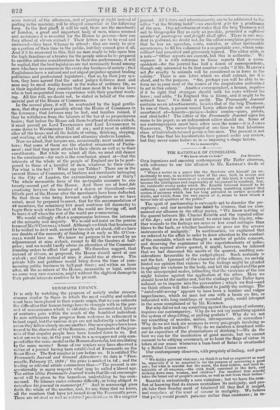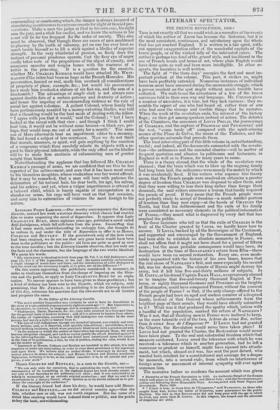THE RATIONALE OF CUDGELLING.
"We know whom we kick." JOE MILLER.
OUR ingenious and amusing contemporary The Tatler observes, with reference to our late allusion to Mr. KEMBLE'S deeds of arms, that "When a writer in a paper like the Spectator sets himself (as un- doubtedly he may, in an abstract view of the case, both in reason and
manhood) against the exercise of a violence of this kind, it would have
become the intelligence and impartiality of his journal to recollect, first, the intolerable wrong under which Mr. Kemble believed himself to be suffering: and secondly, the propriety of saying something against that system of calumny which has too long prevailed in certain periodical works, and which, from the very excess a it, seems to have struck a terror into all quarters of the public."
The spirit of partisanship is- extremely apt to disorder the per- ceptions; and our monitor hast:faildd, to observe, that we com- menced our allusion to the affray.saying, "We know nothing of the quarrel between Mr. Charles Kemble and the reputed editor of the Age; and we do not intend to enter into the inquiry, whe- ther wounds to the feelings are more or less cruel outrages than blows to the back, or whether bamboos or pens are the severer instruments of malignity." In continuation, we explained that we referred to the affair in order to draw attention to the conduct of the constable, which we thought a matter of public concern, and deserving the cognizance of the superintendents of police. From the reproof above quoted, it might, however, be inferred that we had discussed the merits of the quarrel, omitting con- siderations favourable to the cudgel-player. ' Such certainly is not the fact. Ignorant of the character of the offence, we merely hinted our opinion that violence to the feelings might be pleaded in apology for violence to the body, and left the cudgel and the pen in the unsuspen_ded scales, intimating that the virulence of the one might balance against the application of the other. Here we should have let the matter rest, but the chidings of the Taller have induced us to inquire into the provocation ; which we find—and we think others will find—insufficient to justify the outrage. The "intolerable wrong" appears to have been a familiar and vulgar impertinence, which no man but one with a brain on fire, or infuriated with long ranklings of wounded pride, could interpret in the sense complained of by Mr. KEMBLE. But why did we not say something against the system of calumny, inquires our contemporary. Why do we not say something against the system of shop-lifting, or picking pockets ? Why do we not say something of murder, malice, intemperance, or cowardice? Why do we not tack six sermons to every paragraph involving as many faults and frailties ? Why do we mention a drunkard with- out an exposition of the abominations of drinking ?—We do the best we can for the inculcation of good morals, but we cannot consent to be edifying overmuch, or to hoist the flags of virtue in token of our cause whenever a bum-boat of Satan is overhauled by a Bethel Union crew. Our contemporary observes, with propriety of feeling, and good sense, "We dislike personal violence ; we think it as bad an argument as need be, especially if it be resorted to for the purpose of answering a good one; but what is scandal but the worst, the most hidden, and most in- tolerable of all weapons,—the stick itself, exercised in the dark, and striking down man, woman, and children? For recollect that scandal takes the bread out of people's mouths, as well as rest from their bodies. Scandal is undoubtedly a sore visitation ; but we have the com- fort of knowing that its excess neutralizes its malignity, and peo- ple take their Sunday meal of falsehood till they find it insipid, and complain of the want of savour in malignity. We believe that policy would preach patience rather than resistance; in re-
• commending or sanctioningwhich, the danger is always incurred of stimulating sensitiveness to extreme resorts for slight or fancied pro- vocations. Make a man the judge of libel in his own case, his right arm the jury, and a stick his verdict, and we know the actions in his court will be far too frequent for the order of society. This also must be observed, that though there are cases of men maddened to phrensy by the tooth of calumny, yet no one has ever been so much beside himself as to lift a stick against a libeller of superior strength. In the very whirlwind of passion, so finely does the instinct of personal prudence operate, that the fiery.eye of anger coolly takes note of the proportions of the object of enmity, and compares muscles and weighs bones with the wariness of a
better in the prize-ring. It is a question for the casuists, whether Mr. CHARLES KEMBLE would have attacked Mr. WEST- Ac OTT if the latter had been as huge as the French Hercules. His provocation, fancied or real, made him overlook all considerations of propriety of place, example, &c.; but would his provocation have made him overlook a stature of six feet six, and the arm of a blacksmith ? The advantage of single stick is not always sure against double fists of a certain potency and dexterity of action ; and hence the impolicy of recommending violence as the rule of social law against calumny. A gallant Colonel, whose family had been pertinaciously. assailed by a money-extorting libeller, was told that a thrashing would be the best mode of dealing with the fellow. "I agree with you that it would," said the Colonel ; " but I have looked at the rascal with that view ; and though I think I could beat him, it would not be without some bruises—a black eye, per- haps, that would keep me out of society for a month." The same son of Mars afterwards beat an impertinent editor to a mummy. He had found a subject of less resistance. Now we do not think that morals, manners, or spirit, will gain anything by the sanction of a vengeance which thus carefully selects its objects with a re- gard to their physical inferiority,while the only effect on the libeller will be to make him cautious of calumniating men of greater
weight than himself.
Notwithstanding the applause that has followed Mr. CHARLES
KEMBLE'S passage of arms, we are confident that ere this he has repented of his achievement, and seen that it has been most cruel to his blameless daughter, whose vindication was her worst affront. But it may be remarked, that' a man will bear with patience the defamation of his natural hair, his dear teeth, his age, his calves, and his ankles; and yet, when a vulgar impertinence is uttered of a beloved child, which is barely capable of interpretation in a slanderms sense, his rage will have vent on that last occasion, and carry him to extremities of violence the most foreign to his nature.



























 Previous page
Previous page